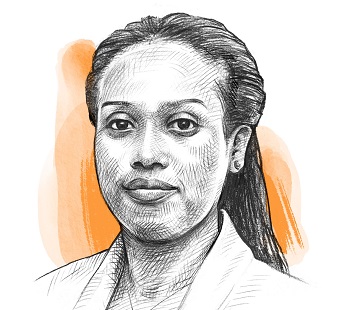Programme of Support for Employment in Border and Peripheral Areas in Burkina Faso
Objective
-
€7mBUDGET
-
01/07/2017PROJECT START
-
3 yearsDURATION
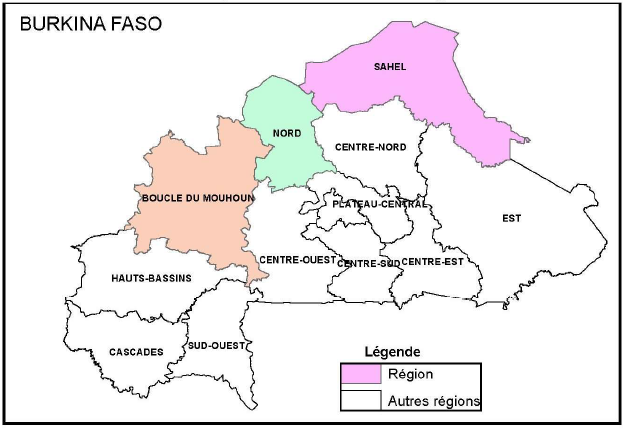
Young people and women, who are particularly hard hit by insecurity and the lack of economic prospects, will be the priority targets of the activities that will be implemented via local civil society organisations (CSOs). Indeed, CSOs are in direct contact with the realities, needs and potential of border regions and will be a key intermediary for the implementation of training activities for young people and women.
There are two specific objectives:
• Improve the employability of young people and women by developing their entrepreneurial capacities through vocational training tailored to local demand.
• Promote the creation of productive jobs by stimulating the development of microenterprises and small businesses.
Our operational strategy
To implement activities to rapidly and sustainably improve the economic situation of young people and women, an initial phase analysed the needs and potential of the regions concerned and the actors in the field. It subsequently established the frameworks for dialogue between the stakeholders on the issues of training, employment and entrepreneurship.
In the second stage, calls for proposals were launched for local CSOs to implement the planned actions. The first call for proposals was launched in January 2018.
Alongside this work, CSOs are offered support to build their capacities to implement the activities. Capitalisation work is conducted throughout the programme.
The implementation strategy for the programme will be based on 8 basic principles that will feed into the various implementation phases and activities:
• Take into account the existing institutional structures and consultation frameworks,
• Find or create a forum for local consultation,
• Rely on in-depth knowledge of the field,
• Reach the most vulnerable populations,
• Call on CSOs to devise and implement relevant and innovative activities,
• Allow CSOs to build their skills,
• Continuously monitor and evaluate to adapt the programme activities.
Efforts will also be made to ensure that the programme and its activities are in line with the strategy prepared and developed by the Ministry of Youth, Training and Vocational Integration.
Objectives
• Train young people over the age of 16 and women in activities that meet a demand.
• Build the entrepreneurial capacities of young people and women, thereby giving them new economic opportunities and allowing them to manage the benefits from their activities.
• Help the young people and women who are trained set up microenterprises and small businesses.
• Economically strengthen the young people and women who are trained or sustainably integrate them into the labour market, reducing the risks of trafficking, smuggling and the attraction of Jihadist movements.
• Increase local economic opportunities and manage their promotion by local associations or groups.
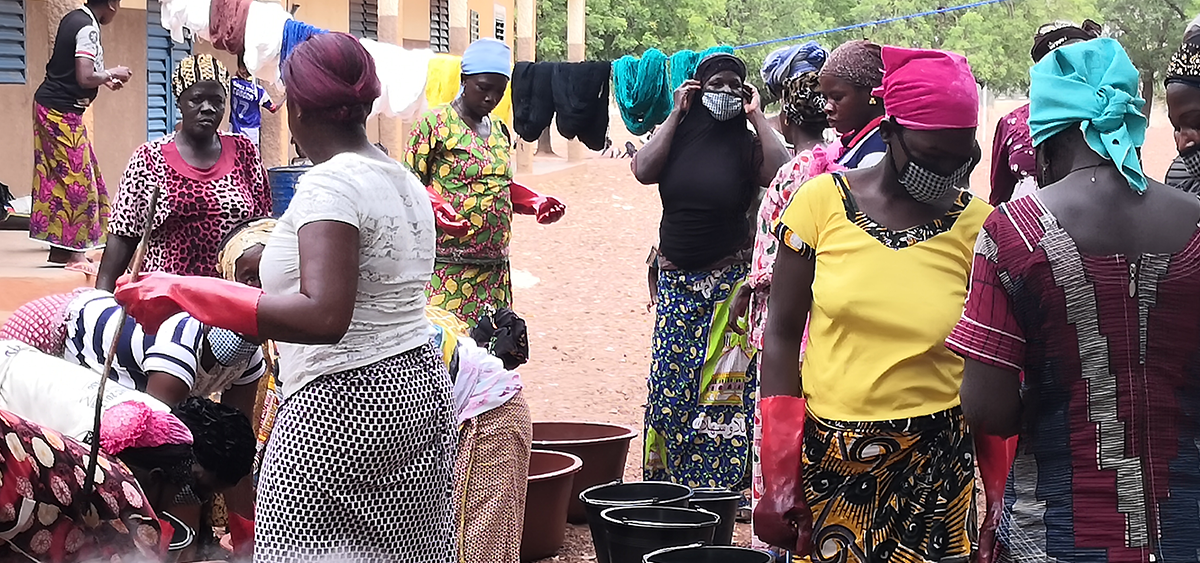
Programme activities
Phase 1: Carry out a diagnostic
There is no lack of international financing in Burkina Faso, especially for youth training and employment. The funding announcements made by the technical and financial partners at the conference of Burkina Faso’s partners held in Paris in December 2016 stood at over EUR 12.2bn. These funding intentions amount to almost 150% of the financing sought, but much of it still needs to be realised.
It is therefore not in terms of means but through the choice of the activities financed that the programme will be able to make a difference.
Three main subjects were examined during the field study, which took place in October 2017 in the three regions concerned by the programme (La Boucle du Mouhoun, North and Sahel): access to vocational training, access to financing for entrepreneurship and the analysis of local civil society organisations.
Access to vocational training
In terms of training, while there are about fifteen institutes, the vocational training programmes lack human and material resources and remain concentrated in regional capitals. For the learners, the training fees, the distances and the “socio-cultural pressure” (particularly heavy for women) are important factors that can limit access to training for young people and women. Furthermore, young people and women are not always aware of all the emerging or high-potential activities, particularly in the fields of crafts, tourism, culture and extractive industries.
Access to financing for entrepreneurship
In terms of access to financing, several methods are available in the regions concerned: private microfinance institutions (MFIs), which are often in the form of cooperatives, and national public funds. However, several barriers have been identified as limiting access to this financing for local people, such as the demand for guarantees or illiteracy, but also the lack of quality of the applications. The study notes that it is generally easier for women to access financing, in particular because of the “solidarity guarantees” provided by various associations and women’s groups. Conversely, young people are generally less organised and do not have the guarantees required by MFIs. Here again, the lack of information about the funding opportunities limits initiatives.
Civil society organisations
Civil society is very dynamic in Burkina Faso, despite the low level of public financing, and has a high degree of freedom of action. During the field study, the interviewers met 21 CSOs working in the education, vocational training and employment sectors in the 3 regions concerned. These CSOs recognise that they face problems regarding the lack of training of their members, the delays in project financing, the lack of synergies between stakeholders, the poor level of training material and the absence of post-project follow-up.
The official launch of the Programme of Support for Employment in Border and Peripheral Areas provided the opportunity to present the results of the preliminary field study and sign a partnership agreement with the Ministry of Youth, Training and Professional Integration.
The project team was subsequently able to identify practical solutions to improve access to training and entrepreneurship for young people and women in these regions.
Read the article: Start-up of the Programme of Support for Employment in Border and Peripheral Areas

Credits: Guillaume Colin and Pauline Peno
Phase 2: Target actions
The field study that was conducted was used to propose targeted and effective activities. Several avenues were followed:
Focus on sustainability
The effectiveness of the funded activities lies in their ability to produce long-term impacts. Two tools have been used in the programme:
• Finance training leading to a qualification, i.e. recognised by the State and employers. This requires specific training engineering work, together with the Ministry responsible for vocational training. The project team has a technical expert for these issues.
• Work together with the Burkina Faso authorities. This is realised through a formal partnership with the Ministry of Youth, Training and Professional Integration and the systematic involvement of the local authorities in the supervision of the funded projects.
Facilitating access to employment through trainingIn May 2018, a workshop was held in Ouagadougou to validate a guide for the operationalisation of the basic qualification certificate (CQB). The CQB, a tool that recognises professional skills, is a gateway to literacy and training, which are two major issues for access to employment in the region. The first certification sessions were held in April 2020.
|
Effectively target employment potential and needs
It seems appropriate to support, through calls for projects, projects in the priority and high-potential sectors of agriculture and livestock farming. Projects to improve production, conserve and package post-harvest products, process agricultural and animal products on a small scale and market animal and plant production will be a focus. The programme will also work on the craft, trade and building sectors.
For further reading: Burkina Faso’s border regions: 33 projects for the employment of young people and women
Finance innovative solutions more suited to local realities
In this approach, the programme directly uses the initiatives of civil society, which is close to the realities on the ground.
There is also the expertise of the project team, which is able to guide these initiatives, especially in terms of good practices. For example, the programme could seek to finance local training courses as a priority, via mobile training units (MTUs) for remote areas or areas at risk in urban centres.
Circumvent the limits related to financial resources
Firstly, the programme will seek to provide access to training for people with no resources, via grants and by bearing the cost of accommodation or meals.
Secondly, it will seek to ensure access to financing for entrepreneurship, which is a major source of job creation. While the current programme is unable to provide direct financing for this, it will promote consultation between MFIs and set up specific and effective partnerships with them. The aim will be either to guarantee loans with financial institutions for the people who are trained, or support efforts for the integration of young people and women in working life.
Furthermore, effective complementarities are currently being identified and formalised with the national investment programmes (Support Fund for Youth Initiatives – FAIJ, Support Fund for Vocational Training and Apprenticeship – FAFPA, Support Fund for the Promotion of Employment – FAPE), other international financing (Agence Française de Développement, World Bank, African Development Bank), and via decentralised cooperation.
1st National Meetings for Vocational Training and Business Start-ups
|
Continuation of the employment support programme in Burkina Faso
In view of the preliminary results of the Programme of Support for Employment in Border and Peripheral Areas in Burkina Faso, and considering the deterioration of the security and social situation in the area, Agence Française de Développement wished to provide financial support for Expertise France’s employment activities.
Expertise France consequently received a EUR 5m grant in September 2019 to extend and further develop the activities implemented under the Programme financed by the European Union.
The objective of Expertise France’s operation through this financing remains the same: contribute to the endemic development of the territories of three regions in northern Burkina Faso – La Boucle du Mouhoun, North and Sahel – in order to promote job creation for young people and women.
Some fifteen additional civil society organisations will be able to receive support in the 3 project regions and a new capacity building plan will be developed for the Ministry of Youth and local authorities.
 More about the Project to support job creation in northern Burkina Faso
More about the Project to support job creation in northern Burkina Faso
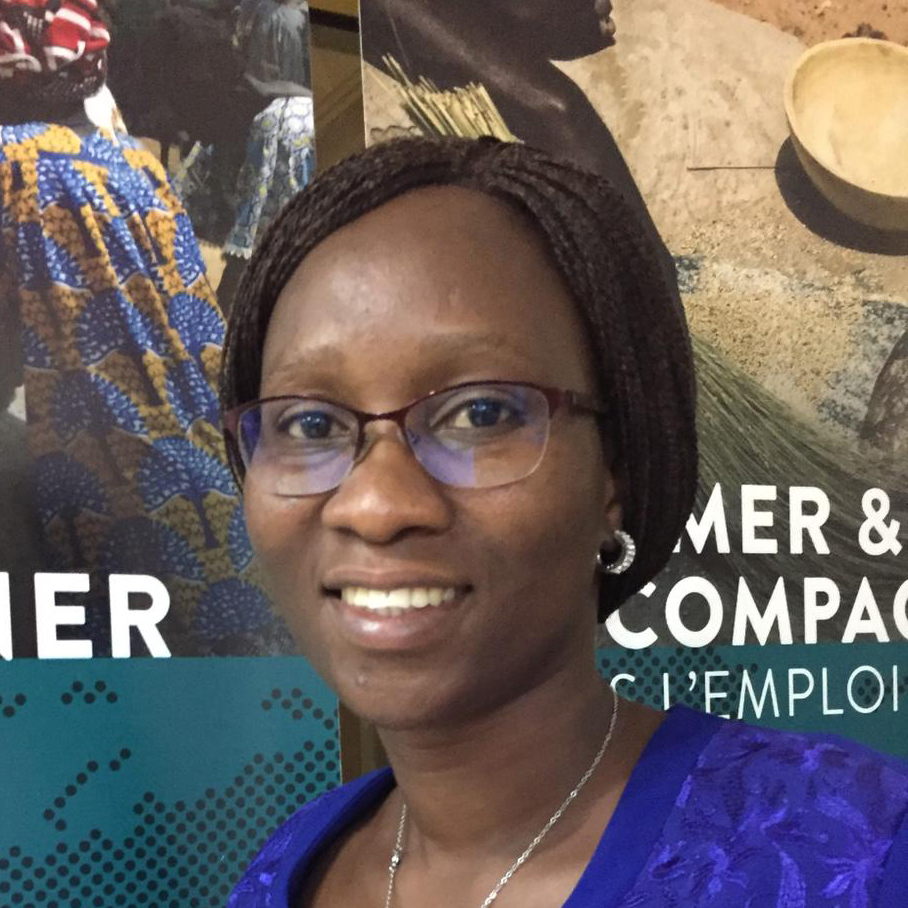 Minsita Traoré, expert in business creation and entrepreneurship
Minsita Traoré, expert in business creation and entrepreneurship
1. How did the selection of projects led by civil society take place?
Our first challenge was to make the call for projects accessible. In addition to a broad dissemination, we went in the field to present and explain its guidelines and answer candidates’ questions. An independent firm subsequently handled the evaluation of the proposals to ensure the preselection was as objective as possible. Each regional council made its final choice based on its priorities and its knowledge of the field.
2. Why a call for projects for territorial authorities?
The objective was to support regions and municipalities in Burkina Faso for local economic development by setting up business clusters and incubators… with a territorial base. These are new concepts in Burkina Faso, especially in the regions. Our support has been decisive in structuring these projects.
3. What support has the field team provided to project initiators?
Each project has been followed individually to specify the content of activities and the expected outcomes. We subsequently trained their managers in project management procedures (accounting, human resources, monitoring-evaluation…). We are now focusing on post-financing and post-training support: we are maintaining an advice and training function, as many small entities need a close follow-up. We also produce support materials (articles, handbooks…) to disseminate this knowledge on a wider scale.


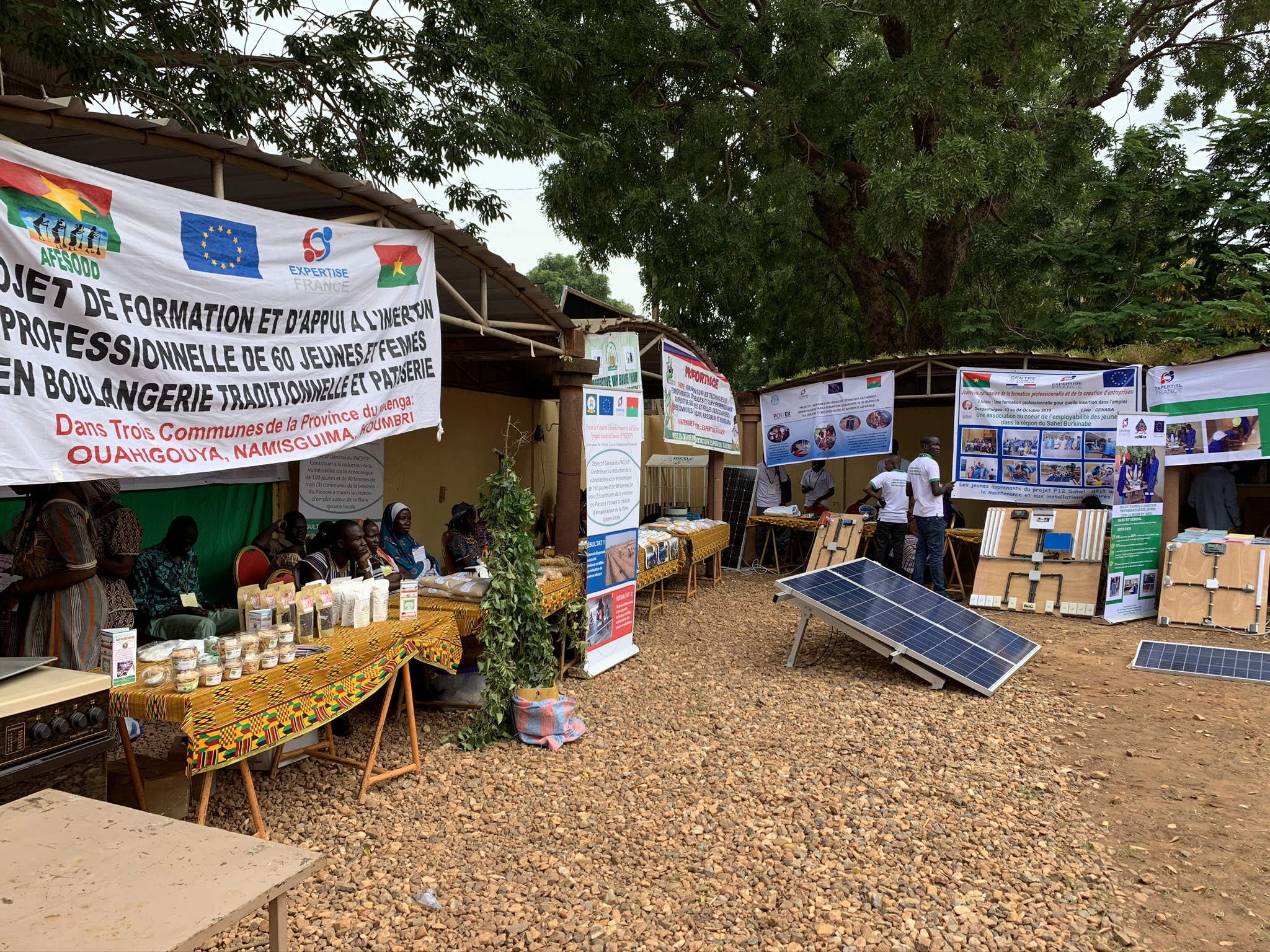 On 3 and 4 October 2019, Expertise France and the Ministry of Youth and Promotion of Youth Entrepreneurship organised the first National Meetings for Vocational Training and Business Start-ups in Ouagadougou. Over 600 people interested in issues related to vocational training and employment in Burkina Faso (local and international NGOs, institutional partners, microfinance institutions, private sector, etc.) were able to meet, create synergies and benefit from advice on setting up projects, financing and partnerships.
On 3 and 4 October 2019, Expertise France and the Ministry of Youth and Promotion of Youth Entrepreneurship organised the first National Meetings for Vocational Training and Business Start-ups in Ouagadougou. Over 600 people interested in issues related to vocational training and employment in Burkina Faso (local and international NGOs, institutional partners, microfinance institutions, private sector, etc.) were able to meet, create synergies and benefit from advice on setting up projects, financing and partnerships.